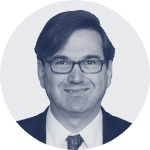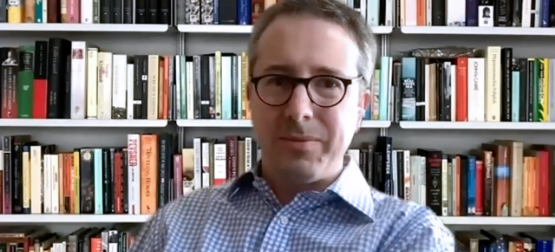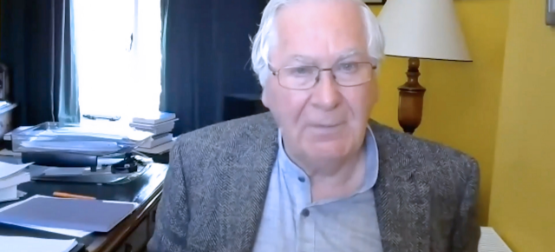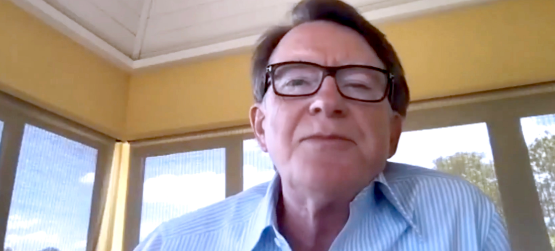Beyond the pandemic
When – and how – will the world recover?
With Jason Furman, Linda Yueh, Martin Malone, Deirdre Trapp and James Harding
One by one, countries are slowly emerging from their coronavirus nightmare. But how has the world been changed by the crisis?
In the first of a series of four digital discussions looking at life beyond the pandemic, we were delighted to be joined by Jason Furman, Professor of the Practice of Economic Policy at Harvard Kennedy School and former chair of President Obama’s Council of Economic Advisers; Linda Yueh, Fellow in Economics at St Edmund Hall, Oxford University and a regular contributor on the BBC; Martin Malone, chief economic adviser at Alphabook; and Deirdre Trapp, a senior partner in Freshfields’ antitrust, competition and trade practice. The topic was COVID-19’s macroeconomic impact – and here are the highlights from the conversation.
As policy now cautiously shifts from lockdown to reopening, debates over R numbers and ICU beds are being supplemented by broader macroeconomic questions centred on what countries can do to recover from the most violent economic downturn in 300 years.
One thing is clear: economies are facing attacks on multiple fronts. Demand is down because people can’t – or won’t – spend money. Supply is shot because multiple businesses can’t operate. For some companies the problem is a lack of liquidity, while others have found their models rendered unsustainable by the crisis. Taken together, the economic impact of the pandemic may significantly outlast the virus itself.
How will the world respond to this litany of challenges? What shape is a recovery likely to take? Our panel had different ideas but coalesced around the following points.
Many countries will see a sharp drop in output in H1 2020 – which in some places could be as high as 30 per cent of GDP. If the pandemic subsides towards the end of the year, we could see a dramatic bounceback. But this is vulnerable to a second wave of infections.
Once we have hit the bottom, we’re likely to see a period of double-digit growth. This, however, will be followed by a third ‘slog phase’ in order to generate growth over and above where we were before the pandemic began. That might take five years. Globally, the recovery will come in waves, and will vary between countries, regions and industries.
Watch Jason Furman on the post-COVID-19 prospects for the US economy:
Rich countries shouldn’t worry about the cost of supporting citizens and businesses through the crisis – at least not in the short term. Debt-to-GDP ratios of 150 per cent or more will become the norm. Having said this, some economies (such as the US) may have to rethink their aversion to taxation as this additional debt will need to be repaid.
Watch Deirdre Trapp on the UK’s pandemic planning:
Large-scale insolvencies, however, are trickier to deal with. The scale of long-term damage (in the form of lost productive capacity) caused by COVID-19 could be huge. After all, business can’t unliquidate, and it’s easier to fire than it is to rehire.
We’re probably not going to see inflation any time soon, but if it does materialise it would bring benefits. It would mean lower real interest rates (which would help investment) and lower real wages (which would help with employment), and it would also help deleveraging in government, corporate and household sectors.
Watch Jason Furman on why inflation would be a good thing right now:
Asian countries have generally handled COVID-19 better than the West, thanks partly to their experience with pandemics, but also because they were quicker to implement full-scale suppression tactics. The region is generally ahead of Europe and the US in terms of both technology around – and public appetite for – health- based surveillance, including contact tracing.
Watch Linda Yueh on why Asian countries have fared relatively better in tackling the coronavirus:
Whatever happens, millions of jobs in sectors such as hospitality and tourism are at risk. We’ll see a lot fewer of some things, like restaurants, and a lot more of others, like deliveries. Socially, the pandemic will challenge a capitalist model already under pressure from populism and years of austerity.
Amid the gloom there is cause for optimism – at least among investors. The rate of healthcare innovation is running 10 times higher than at any point in history, and unprecedented collaboration between biotech and pharma has made massive manufacturing capacity available to roll out potential therapies and vaccines. Monetary and fiscal interventions go well beyond the impact of COVID-19 on advanced economies. Some analysts are surprisingly bullish on the outlook for markets. Let’s hope they’re right.
Watch Martin Malone on why he’s bullish about the macro outlook:
To rewatch the discussion in full, click here:
Our experts

James Harding (Chair)
James is a co-founder and an editor of Tortoise Media. He started his journalistic career at the Financial Times before becoming the youngest ever editor of The Times newspaper in 2007. He later moved to the BBC as director of news and current affairs.

Jason Furman
Jason is Professor of the Practice of Economic Policy at Harvard Kennedy School. He was a top economic adviser to President Obama throughout his two terms in the White House and served as chair of the US Council of Economic Advisers from 2013 to 2017.

Linda Yueh
Linda is a Fellow in Economics at St Edmund Hall, Oxford University; Adjunct Professor of Economics at London Business School; and former chief business correspondent for BBC News. She has written several books on economics, with a particular focus on China, and has advised organisations including the World Bank and the World Economic Forum.

Deirdre Trapp
Deirdre is a senior partner in Freshfields’ antitrust, competition and trade practice. She advises clients in sectors from retail to financial services on contentious and non-contentious competition matters.

Martin Malone
Martin is chief economic adviser at the macro advisory firm Alphabook and a regular commentator for Bloomberg TV.
What we do
What we do
Everything we do will help grow, strengthen and defend your business.
Our global teams span specialisms, regions and industries to deliver against three fundamental client needs: transactional, regulatory, risk.


